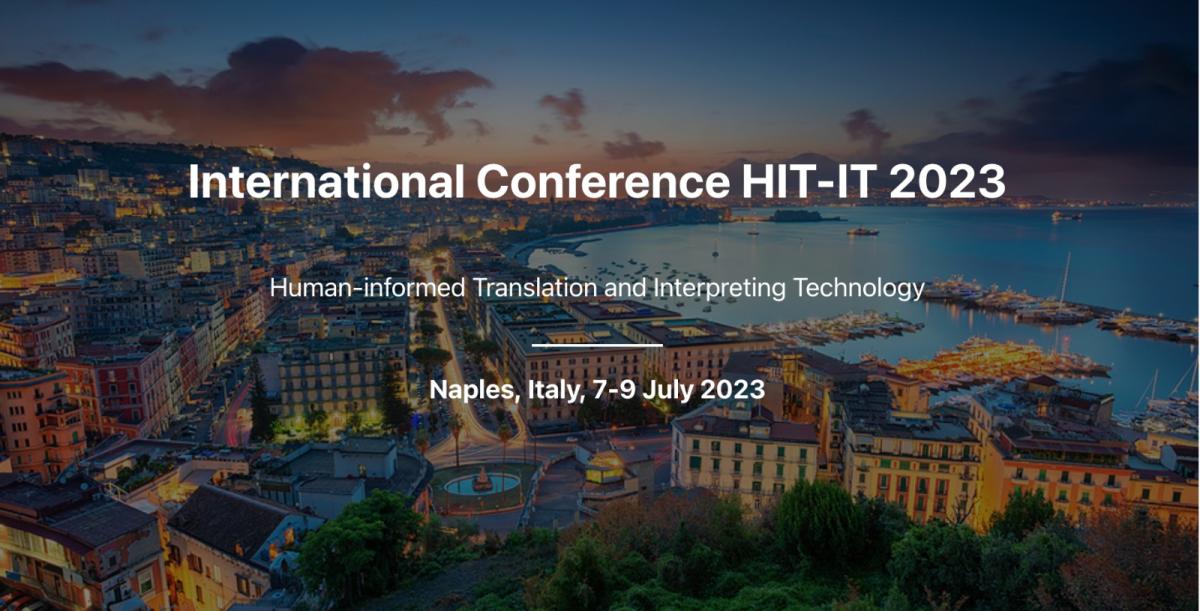
ABOUT THE CONFERENCE
We are pleased to announce the International Conference on Human-Informed Translation and Interpreting Technology (HiT-IT 2023). HiT-IT 2023 http://hit-it-conference.org/home/ is a follow-up of the successful HiT-IT workshops, which took place in Varna, Bulgaria in parallel to the international conferences RANLP 2017 and RANLP 2019. The conference will take place in Naples, Italy between 7 and 9 July 2023. The conference will be preceded by tutorials on 6 July 2023.
HiT-IT seeks to act as a meeting point for (and invites) researchers working in translation and interpreting technologies, practicing technology-minded translators and interpreters, companies and freelancers providing services in translation and interpreting as well as companies developing tools for translators and interpreters. In addition to the accepted papers for presentation, HiT-IT will feature invited talks by prominent experts as well as presentations and panels hosted by practitioners.
Most of the existing conferences are either focused too much on the automatic side of translation or concentrate largely on translators’ and interpreters’ professions. HiT-IT seeks to fill in this gap by allowing the discussion, the scientific comparison, and the mutual enrichment of professionals from both fields. HiT-IT 2023 addresses the development of translation tools and the experience translators and interpreters have with these tools as well as the development of machine translation engines, incorporating human (translators and interpreters’) expertise. The conference also offers a discussion forum and publishing opportunity for professionals from the human translation and interpreting fields (e.g. translators including subtitlers, interpreters, respeakers, researchers in translation and interpreting studies) and for researchers and developers working on translation and interpreting technology and machine translation. The idea behind this conference attendees to hear the other side’s position and to voice their opinions on how to make translation technologies closer to what would be accepted by large audiences, by incorporating human expertise into them.
TOPICS
We invite papers on the following four main themes, however, submissions on related themes/topics will also be considered. Both theoretical ideas and practical applications are welcome. Position papers promoting new ideas, challenging the current status of the fields, and proposing how to take them forward are also encouraged.
User needs:
- analysis of translators’ and interpreters’ needs in terms of translation and interpreting technology
- user requirements for interpreting and translation tools
- incorporating human knowledge into translation and interpreting technology
- what existing translators’ (including subtitlers’) and interpreters’ tools do not offer
- user requirements for electronic resources for translators and interpreters
- translation and interpreting workflows in larger organisations and the tools for translation and interpreting employed
Existing methods and resources:
- latest developments in translation and interpreting technology
- electronic resources for translators and interpreters
- annotation of corpora for translation and interpreting technology
- crowdsourcing techniques for creating resources for translation and interpreting
- latest advances in pre-editing and post-editing of machine translation
- human-informed (semi-)automatic generation of interlingual subtitles
- technology for subtitling
Evaluation:
- (human) evaluation of translation and interpreting technology
- crowdsourcing techniques for evaluating translation and interpreting
- evaluation of discourse and other linguistic phenomena in (machine) translation and interpreting
- evaluation of existing resources for translators and interpreters
- human evaluation of neural machine translation
Other:
- position papers discussing how machine translation should be improved to incorporate translators’/interpreters’ expertise
- translation and interpreting technologies’ impact on the market
- comparison between human and machine translation
- changes in the translators and interpreters’ professions in the new technology era especially as a result of the latest developments in Neural Machine Translation
Besides the above topics, submissions from industry and practitioners could discuss: distinctive work experience, ongoing practical work, in-house procedures or software, in-house processing pipelines, technology needs, managing a translation (technology) company, interpreters in the technology era, IP issues or any topic related to their professional activities in the field of (technology for) translation and interpreting, etc.
ORGANISATION
HiT-IT is organised by the University of Wolverhampton, the University of Surrey (United Kingdom), the University of Malaga (Spain), and the University of Naples L’Orientale, (Italy), and the Association of Computational Linguistics (Bulgaria).
Conference Chairs
Gloria Corpas Pastor (University of Malaga)
Ruslan Mitkov (University of Wolverhampton)
Johanna Monti (University of Naples L’Orientale)
Constantin Orasan (University of Surrey)
Organising Committee
Dayana Abuin Rios (University of Malaga)
Khadija Ait Elqih (University of Naples l’Orientale)
Anastasia Bezobrazova (University of Malaga)
Meriem Boulekhoukh (University of Oran)
Rocío Caro Quintana (University of Wolverhampton)
Amal El Farhmat (University of Malaga)
Lilit Kharatian (University of Malaga)
Nikolai Nikolov (INCOMA Ltd.)
Daria Sokova (New Bulgarian University)
The Programme Committee members and the invited speakers will be announced in the second and further calls.
